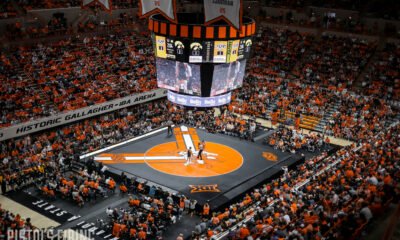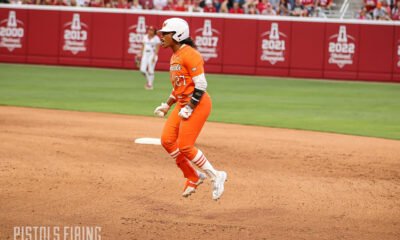Hoops
Q&A With Eddie Documentary Filmmaker Chris Hunt
We recently had the opportunity to talk with Chris Hunt, who’s directing the upcoming documentary “Eddie,” which follows the career of former college basketball coach and OSU great Eddie Sutton. Hunt, the senior creative director at 1577 productions in Oklahoma City, has been working on the project for over a year.
You can see their new teaser here and listen to our podcast with him here.
Thomas Fleming: So how did the creation of this documentary come about?
Chris Hunt: I’ve been working in this industry for a while and had always wanted to do a sports film. I had some different ideas on what to do but then it just kinda hit me one night. I was like “Eddie Sutton — no one’s telling his story,” and it’s got all the elements you’d want in a good film.
I actually sat on the idea for two or three days and just kinda letting it marinate. Fast forward and one thing led to another, and I was in Eddie’s living room two or three months later. And we just pitched him the idea for the film. I think they enjoyed (the idea of telling their story), and I made it very clear in that meeting that even though I was an OSU fan and an Oklahoma State guy, we wanted to tell the whole story so it’s not just a propaganda piece or not just a piece to try and get him in the (College Basketball Hall of Fame).
We’re telling his story because I think it’s deserving of telling and hopefully, at the end of the day, entertaining. The hall of fame thing did bother me a lot as a fan, so there was that element that perhaps could be woven into the film because there are a lot of questions to why is he not in the hall of fame.
If you look at his coaching record, it’s pretty clear he’s a hall-of-fame coach, but for whatever reason he’s just not getting in. And so that intrigued me. So there was that element of discovery that I wanted to explore. Fortunately, the Suttons after they met with us liked us and decided to go ahead with the project.
TF: Once you got the go-ahead, did you get immediate support from the people you reached out to?
CH: As far as getting people to be in the film, for the most part, yes. I will say we’ve had a lot of success getting the people we want in the film into the film. Some people have been quite hard just because schedules are so crazy. We were able to get together the triplets from Arkansas. That was Marvin Delph, Sydney Moncrief and Ron Brewer. And they took Arkansas to Eddie’s first Final Four in 1978. So it was pretty cool to have three Arkansas legends on the court at the same time. That was neat, and I think it took us eight months to get Bill Clinton but we got him. And I think that’s just a testament of perseverance and wanting to tell the story.
TF: So who at OSU have you interviewed?
CH: So far, the big ones who we’ve interviewed are Big Country, Tony Allen and Doug Gottlieb. I’m getting ready to interview Doug again here in the next few weeks alongside Desmond Mason and Joe Adkins. We’ll do the same thing with them as we did with the Arkansas guys. We put together a group of guys at Kentucky as well.
So we’ve got those guys, and then we’ve also interviewed Andre Williams, who was of course part of that horrible plane crash team. In terms of who stood out to me, I’ll be honest in saying that Andre did. Andre was quite real and did a great job in telling the story. I thought that he was in a lot of ways a lot like coach as far as just his human experience.
I mean you know he’s talking about something that happened that was an absolute tragedy, so of course it’s pretty emotional stuff. But he was great at it, did a great job and I was really impressed with him. Tony was super cool as you might expect. Tony was a cool guy and someone who I know holds Eddie very close to his heart. Eddie really helped him a lot grow up and become the professional that he became.
Doug is obviously a fantastic storyteller and very charismatic. I think it’s very easy to see why he’s good as what he does, and I look forward to talking with him, Desmond and Joe about those great teams. Bryant (Reeves) was really good. He did a good job at talking about that ’95 run and all that. So it’s been a great experience as an OSU guy to go down memory lane with some of those teams. Those were the teams that I followed were part of my young childhood that meant so much to me.
TF: You used the Oklahoma State campus fairly extensively for your interviews. This must have been a conscious decision, but why was that an important part of the documentary to you?
CH: I think that it’s very important that the environment in which the characters are filmed speak to the story or provide an environment where the character can feel comfortable enough to give out the information I feel like we need to get out to make the film strong.
So for instance, with Coach Dickey, whom we filmed at (Delta Tau Delta fraternity at OSU), I wanted an intimate environment that felt homey and an environment in which they could open up to me.
For Rex Chapman, I wanted to film him inside Rupp arena because Rex Chapman is one of the all-time greats in Kentucky basketball, and that was his house in the 80s. I also like filming the guys putting them back on the sideline or maybe these players who played a long time ago but we remember them being on the court. Whenever I interviewed Sean, I wanted to film him inside his home because I knew he would be comfortable there and he talks about a lot of tough stuff. And so I don’t want him to be in a business environment. So I’m very aware of where we film, and hopefully with some of the campus stuff we shot, the audience that’s not familiar with any of these schools can get an idea of the cities in which they reside.
TF: What’s something about Coach Sutton that really comes out in the film? Or maybe something about his career that many fans may have forgotten?
CH: We all associate Eddie with hard-nosed defense and his discipline, but another cool thing is that I remember coach starting in about 1990 when he was hired at Oklahoma State. I didn’t know of him before that. I was a kid, but most OSU fans just recall him as a grandpa figure. Well, it was kind of fun to hear Arkansas and Kentcky players describe him and talk about how cool and hip he was. Also how Eddie was a top-five coach in the country in college basketball and we hear about there was absolutely nobody in the game that coached up defense as well as he coached up defense. No one did it as good as him. And we heard it from player after player.
So it’s something that you kind of know because as OSU fans we knew that that was his calling card, but it was really cool to hear it from everybody else. It meant something. In terms of things that fans may not remember, those first couple of teams he had are maybe forgotten and that might have been his best teams at Oklahoma State. They ran into a historic team at Michigan with the fab five, and that team in ’92 actually could have probably won a national title at Oklahoma State. Actually, we talked to Coach (Bill) Self, and he said that was their best team. Not to take away from the ’95 team or the 2004 team, but that team was loaded. They were loaded and they just got a bad draw. So I mean that’s one that I think they wish they had back a bit.
TF: There’s got to be a ton of footage that you went through. How fun was it to see his development as a coach and all the notable moments.
CH: It’s awesome. It’s an honor, frankly. I feel a lot of responsibility. I feel a good pressure, you know? Research is fun. We’ve uncovered some pretty cool stuff. Some moments have probably been forgotten about it were huge at the time. But now, 30 years later, they’re a bit off the radar. I cant get into the specifics of the stuff I’ve found but it’s very revealing.
TF: What’s the timeline for the film?
CH: I can’t say for sure, because we actually just secured another interview that’s important of the film and that’s not going to happen until June or July but he’s so important that he’s worth waiting. So the goal is the summer for me, but it’s probably going to be late summer or early fall. We’ve already started to edit the film. That’s the goal.
TF: What do you hope to accomplish with the completion of this film?
CH: For one, I want it to be a film that’s entertaining for the audience, but I hope that it puts Eddie Sutton back on the radar. I hope that it allows people to have a look at a historic coach for people who might have otherwise forgotten about him. I’m hopeful that the audience walks away feeling that he was a man much like all of us — someone who had his flaws but was able in a lot of ways to overcome all of that and inspire and change many lives. He was great at what he did.
As far as the movie goes, we will submit it to festivals and run. I hope as many people watch it that can possibly watch it. We’re working hard to put ourselves in the position to where we can get some sort of distribution deal. We are not putting any limitations on this film. We want it to be as big as it possibly be and we’re working hard to achieve that. Hopefully big things come of it.

-

 Football3 days ago
Football3 days agoOklahoma Transfer Gavin Freeman Commits to Oklahoma State
-

 Wrestling2 days ago
Wrestling2 days agoOSU Wrestling: 2020 Olympic Gold Medalist David Taylor Named Head Coach of Cowboy Wrestling
-

 Football5 days ago
Football5 days agoReport: Cornerback Jordan Reagan Enters Transfer Portal
-

 Softball4 days ago
Softball4 days agoOSU Softball: Cowgirls Secure Bedlam Series Win with 6-2 Victory against Sooners






